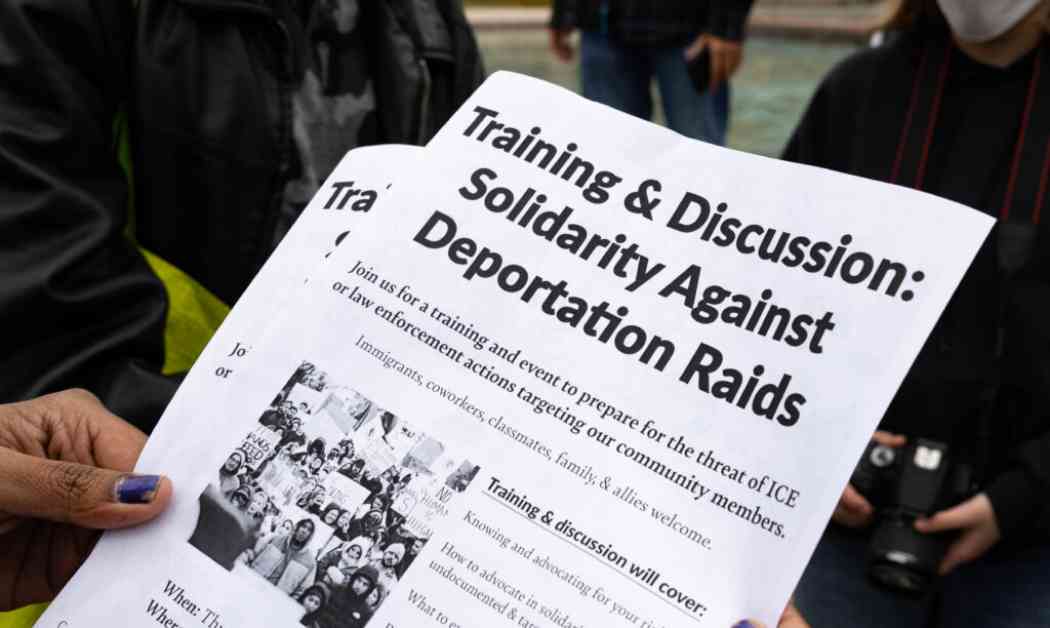Cactus, Texas, a quaint small town located an hour north of Amarillo in the Panhandle plains, experienced a significant event two weeks before Christmas in 2006. During this time, approximately 10% of the town’s population vanished without a trace. The disappearance was a result of an immigration raid conducted by enforcement officers at the Swift and Company slaughterhouse on the northwestern outskirts of the city. This raid led to the arrest of 297 workers in Cactus as part of a larger operation targeting Swift facilities across the nation. The incident remains one of the largest Immigration and Customs Enforcement (ICE) raids in history.
In light of the current administration’s pledge for more workplace raids, investigative journalist Jack Herrera from Texas Monthly delved into the aftermath of the Cactus raid that shook the town years ago. Herrera vividly recounted the chaos that ensued when ICE agents descended on the slaughterhouse premises, triggering a panic among workers. Tales emerged of individuals frantically seeking refuge in various hidden spots within the facility, from crawling into machinery to concealing themselves among the carcasses of cows awaiting processing.
Following the mass arrests, a poignant reality emerged in Cactus – a significant number of children were left parentless, prompting a swift community response. Local organizations, including the Catholic church and school system, rallied to provide support and find homes for the children left in a vulnerable position. The profound impact of the raid extended beyond the personal realm, as the town’s economic stability was severely compromised. The Swift and Company slaughterhouse, the primary employer in Cactus, suffered a devastating blow with the sudden loss of half its workforce, plunging the local economy into uncertainty.
The repercussions of the raid prompted Swift to embark on a nationwide recruitment campaign to replenish its workforce. Despite offering competitive wages well above the minimum standard, the company struggled to attract domestic-born workers to fill the vacant positions. Herrera noted the persistent challenge of drawing American employees to labor in the meatpacking industry, historically dominated by recent immigrants seeking stable employment opportunities. The nature of the work, involving tasks like slaughtering animals and processing carcasses, proved to be a deterrent for many American workers with alternative job prospects.
As Swift grappled with the dilemma of securing new staff, the company turned its attention to refugee populations as a potential source of labor. Collaborating with resettlement organizations, Swift welcomed individuals from diverse backgrounds, including refugees from countries like Burma, Somalia, and Sudan. This strategic recruitment approach not only addressed the labor shortage but also enriched the town of Cactus with a vibrant multicultural workforce. Herrera highlighted the significant contribution of foreign-born workers, who comprised over half of the town’s population, fostering a rich tapestry of cultural diversity.
However, the future outlook for towns like Cactus appears uncertain under the current administration’s stringent immigration policies. President Trump’s restrictions on refugee resettlement and tightening of regulations for legal immigration pose challenges for industries reliant on foreign-born labor. The closure of avenues for refugee employment could exacerbate labor shortages in critical sectors, raising concerns about the long-term viability of businesses in communities like Cactus.
In light of these developments, the fate of towns dependent on immigrant labor hangs in the balance, underscoring the intricate interplay between immigration policies and economic sustainability. The narrative of Cactus serves as a microcosm of broader debates surrounding immigration, job markets, and community resilience in the face of unforeseen challenges. As the nation navigates complex issues at the intersection of immigration and labor dynamics, the implications resonate far beyond the confines of a small town in Texas.
If you found the reporting above valuable, please consider making a donation to support it here. Your gift helps pay for everything you find on texasstandard.org and KUT.org. Thanks for donating today.















